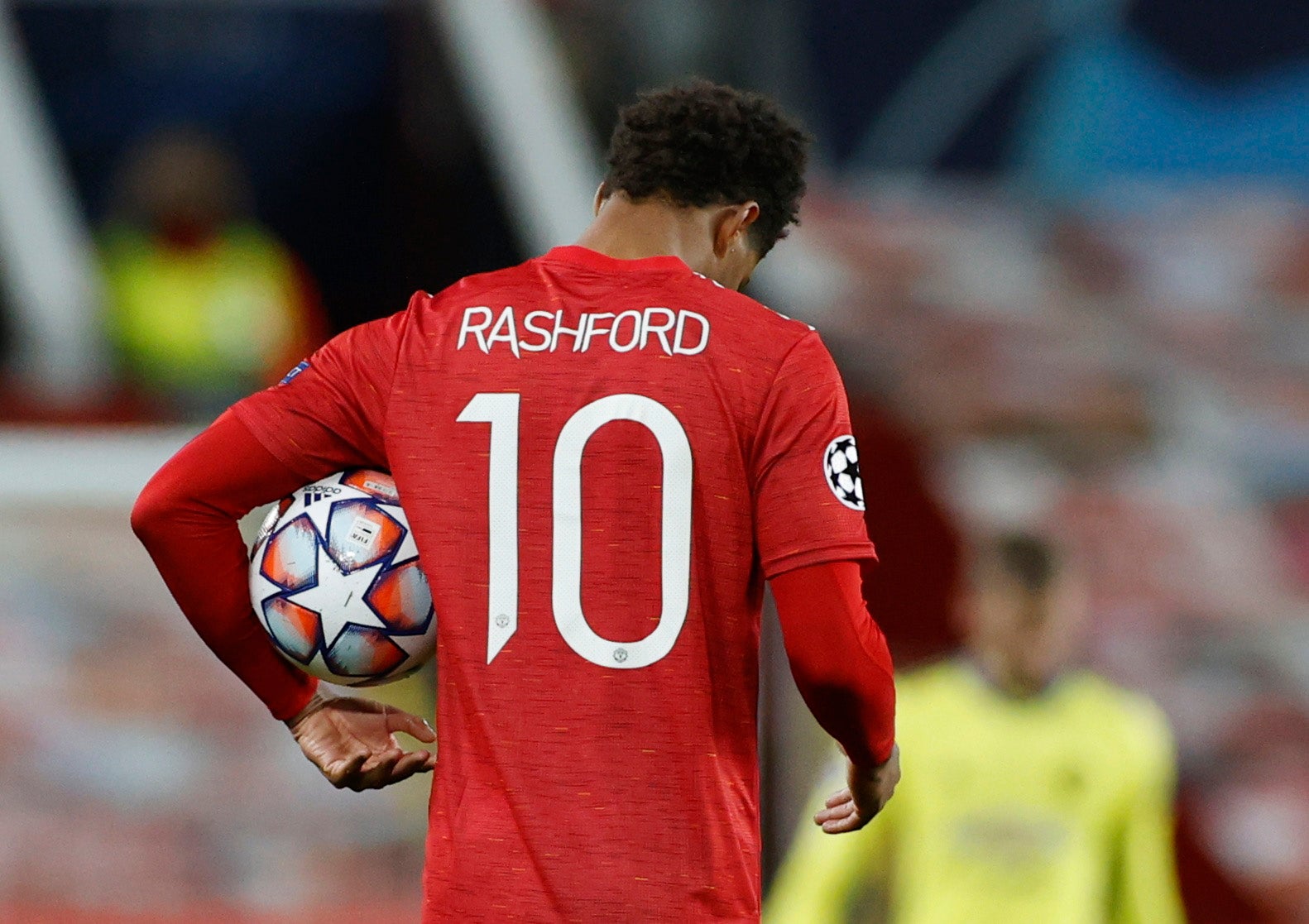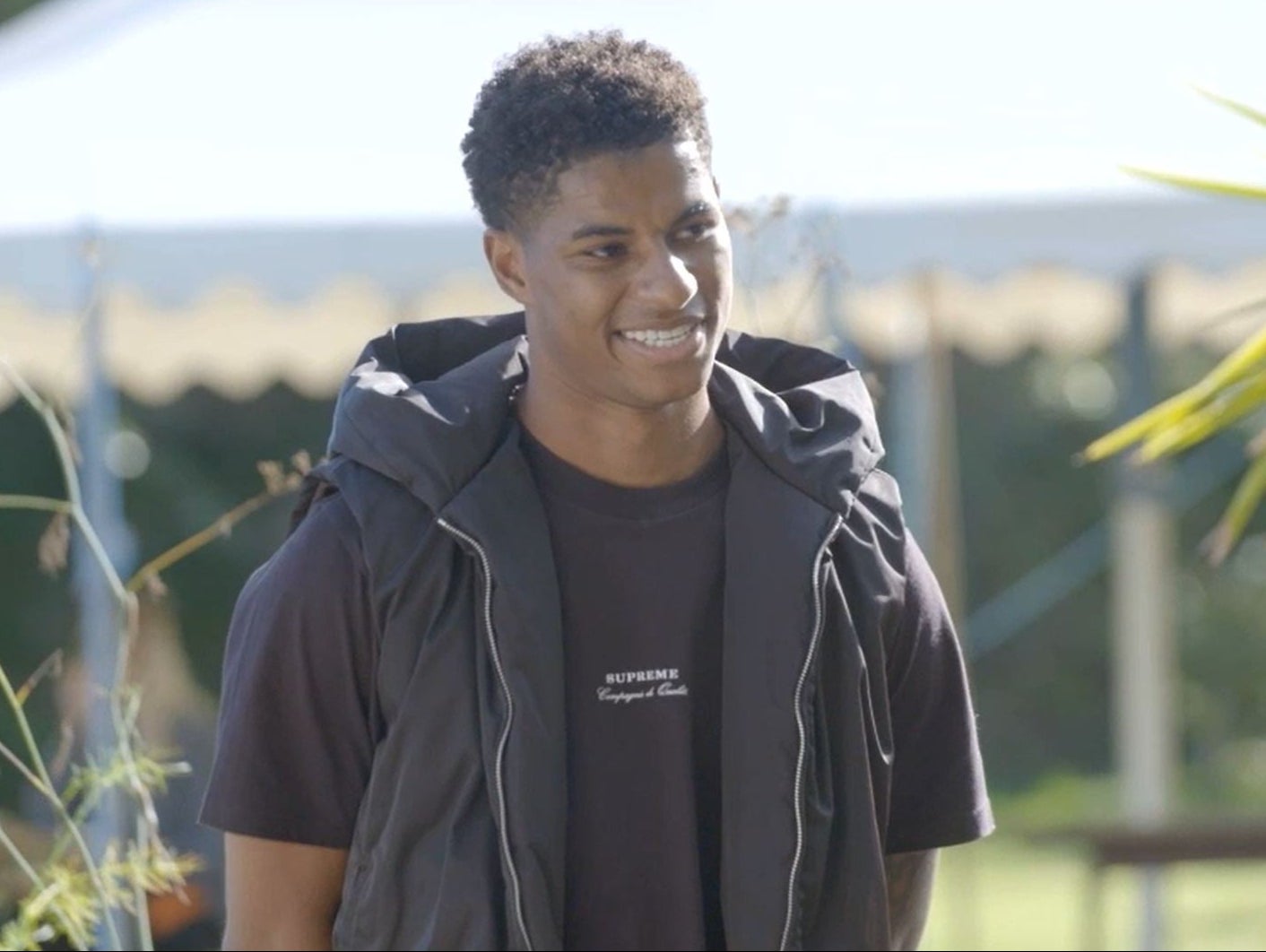Marcus Rashford: How Manchester United’s number 10 caused consternation in No 10
Sean O'Grady looks at the rise of the striker whose child poverty campaign has taken hold across the nation


So, happy birthday, Marcus Rashford, born at Halloween, 1997. It is a further coincidence, entirely, but interesting to note, that his arrival came roughly at the same time as the election of Tony Blair’s New Labour government and, shortly after, its vow to end child poverty within 20 years. If all had gone according to plan, Britain would now be celebrating a landmark social liberation, and hungry kids would be a thing of the past.
Well, as we all know, the poor and the hungry are still with us, and while New Labour’s policy never came of age – the target was dropped by the Conservative government in 2016 – its greatest proponent, Rashford, has reached a remarkable political maturity. More than anyone for a decade or more, Rashford has put child poverty firmly back in the political agenda.
Such was his success over the summer, when he launched his first campaign to extend free school meals into the holidays, that 1.3 million children were fed who might otherwise have gone without. They might, in other words, have suffered the same pain that he movingly described in his open letter to Conservative MPs: “My mum worked full-time, earning minimum wage to make sure we always had a good evening meal on the table. But it was not enough. The system was not built for families like mine to succeed, regardless of how hard my mum worked.
“As a family, we relied on breakfast clubs, free school meals, and the kind actions of neighbours and coaches. Food banks and soup kitchens were not alien to us; I recall very clearly our visits to Northern Moor to collect our Christmas dinners every year ... political affiliations aside, can we not all agree that no child should be going to bed hungry?”
Well, they did agree, and sufficient pressure was placed on No 10 for the government to U-turn and extend free school meals. Boris Johnson was forced to change policy. A prime minister who once belonged to an Oxford dining club where novices were required to burn a £50 note in front of a homeless person was now obliged to bow to the demands of a young black footballer from a background unimaginable to him. Rashford has not, yet, repeated the achievement this time round, but, like his late hat-trick of goals for Manchester United this week, he has time on his hands. In the meantime he has mobilised a national movement of councils, charities, retailers, food manufacturers, cafes and restaurants to help feed the poor.
Rashford has other advantages too in his campaigning. In his way – a very modern way of celebrity and social media – he is an old-fashioned social reformer. If he presses forward with his campaign on food poverty he might yet emulate the great social reformers of the past, names such as Lord Shaftesbury, Elizabeth Fry or William Beveridge. Rashford too has a powerful cause, a certain eloquence, a moral fervour, and a feeling that history and the public are on his side.
Fame helps too. He is a popular figure playing in one of, if not the, most popular leagues in the world. He is a star, and a likeable one. He has a formidable following – 3.7 million on Twitter for example, not so far behind the 5.8 million for 10 Downing Street – and is adept at using it.
Interestingly, Rashford hasn’t, so far, been subjected to the sort of campaign of hate that might be anticipated from the right of politics and journalism. A few Conservative MPs, such as Ben Bradley and Steve Baker, have attempted to push back, and predictably been rewarded with derision. Yet even they were compelled to play the ball rather than the man, complaining about “nationalising children”, whatever that means. Even Bradley, with his “out of context” remarks about food vouchers ending up in brothels and crack dens was essentially arguing about policy, not casting personal aspersions. There has been little from the usual vipers in the Fleet Street gutters hissing about the “hypocrisy” (as they would see it) of a Premier League footballer worth £65m telling the hardworking middle classes to pay more tax to support the feckless classes. Personal attacks, the kind of character assassination usually meted out to “do-gooders” such as human rights lawyers, Church of England prelates or Gary Lineker are curiously absent. Only Rod Liddle in The Spectator has thus far chanced his arm, and only a bit: “I have nothing against Marcus Rashford. It is rather cheering to see an overpaid kid both grateful for his good fortune (and abilities) and determined to use his profile to make the world a better place, as he sees it, rather than inhaling hippy crack or posting photographs of his new Ferrari. His finishing has tailed off of late, you have to say...”
Part of his apparent immunity is because Rashford doesn’t get up to the same kind of off-the-pitch nonsense as some of his superstar predecessors at Manchester United, such as Wayne Rooney, George Best and even David Beckham. Rashford has, so far as one can judge, a steady partner, Lucia Loi, who is in public relations, and they keep a low profile. His two elder brothers, Dwaine (36 this year) and Dane (27) represent him in his football activities, and secured his present £200,000-a-week salary. His half-sister Tamara Rashford is a Miss England finalist, and an events coordinator. His eldest sibling, Chantelle, is 15 years his senior. He looks after them all financially, including houses, but hasn’t attracted the kind of sneering Raheem Sterling did when it emerged that he’d bought his old mum a £2.5m mansion. There was something distasteful about the way the press went to town on that.
Rashford’s mother’s £800,000 dream home has been free of censure, which must be progress of sorts for media ethics. His MBE and work for charity FareShare also helps shield him from vulgar abuse.
In any case, Rashford and his folks have given the tabloids nothing to get their teeth into: far from it in the case of his saint-like mother. Melanie Maynard, in her time working at Ladbrokes online, also avoids publicity, and doesn’t say much. She was born in St Kitts, and is a devout Christian and her children are obviously testament to her qualities as a mother, bringing up a family singlehandedly in Wythenshawe, a working-class district of Manchester. She, like many single mums, is living proof that they too can do the job. Rashford said this, rather pointedly, about her in his open letter to the MPs: “I’ve read tweets over the last couple of weeks where some have placed blame on parents in having children they ‘can’t afford’. That same finger could be have been pointed at my mum, yet I grew up in a loving and caring environment. The man you see in front of you today is a product of her love and care. I have friends who are from middle-class backgrounds who have never experienced a small percentage of the love I have gotten from my mum: a single parent who would sacrifice everything she had for our happiness.”
Of her boy she has said: “While other people got into drugs and gangs, I made sure Marcus kept his head on his shoulders.” A friend has been quoted as saying: “His mum Mel is very protective. She always kept him on the straight and narrow. She’s pretty religious and instilled her religious beliefs into him. He kept out of trouble when other family members haven’t.”
We don’t hear so much about Rashford’s father, Robert. He and Melanie separated while Marcus was quite small, but Robert, a coach with amateur teams, played some part in fostering his talent. He noticed his son’s natural talent and ingenuity very early on: “His running was very smooth and elegant. But it wasn’t just his ability. He was self-driven and curious. He always had a trick, and practised any chance he got. Even when he was picked up to go to training, the coaches would frequently find him knocking a ball onto the roof of a shed or garage, and trying to control it as it came down. Either that or he would be chipping a ball into a bin.”
He grew up quickly in all senses, becoming unusually tall by about 14, which he reportedly found a bit tricky to deal with (he stands 6ft 1in now).

At age five, little Marcus was playing for the Fletcher Moss Rangers, which you might think of as a kind of prep school before he moved on, at 7, to the Manchester United Academy, the Eton College of football. By 2012 he was in the England under-16 squad, and Roy Hodgson had him on board for the Euro 2016 competition. He scored his first World Cup qualifying round goal a year later, and took over the famous, and prophetic, number 10 shirt from Zlatan Ibrahimovic. His heroes include Rooney and Tim Howard, but there is a special bond of mutual admiration between Rashford and the Brazilian Ronaldo, who said this of the forward: “I can see some of myself [in Rashford] for sure – he has courage and he’s fast and is very good with the ball. I think for the strikers they have to be hungry to score, and I see that with him. He has an amazing future.”
There seems little question of that. Rashford is signed up with the Roc Nation agency which represents him for his celeb-y, non-football activity and has supported him in his food poverty campaigns. The agency, associated with Jay-Z, is a pretty ambitious one, with an arm devoted to philanthropy as well as the usual endorsements (Nike and McDonald’s in Rashford’s case). The CEO of Roc Nation, Michael Yormark, described its approach like this: “We sign players to a 360-degree partnership, which encompasses transfers, boot deals, strategic brand building, media, PR, marketing, digital and commercial partnerships – alignment across all of those fields is key.”
Some tip Rashford as a future England captain, and, as a new type of celeb-activist with a cause he feels so passionately about he seems destined to be part of national life and the national conversation for a long time to come. He would not be where he is now if he was a quitter, and he won’t stop his campaigning until he’s got what he wants. And when he gets it, we all know who he’ll thank first of all.


Join our commenting forum
Join thought-provoking conversations, follow other Independent readers and see their replies
Comments